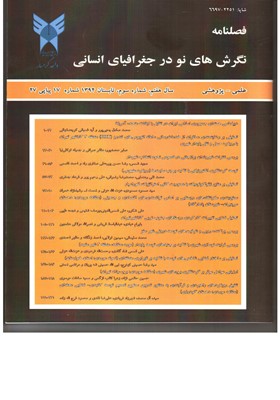راهبرد عوامل ساختار قدرتهای برتر جنوب غرب آسیا چرایی قدرتهای فرامنطقه ای بر علل برتر جلوه دادن رژیم اشغالگر قدس
محورهای موضوعی : کالبدیمهرعلی عباسپور 1 , کیومرث یزدان پناه 2 * , عزت الله عزتی 3
1 - دانشجوی دکتری جغرافیای سیاسی، واحد علوم و تحقیقات، دانشگاه آزاد اسلامی، تهران، ایران
2 - استادیار جغرافیای سیاسی، دانشگاه تهران، ایران
3 - دانشیار جغرافیای سیاسی، واحد علوم و تحقیقات، دانشگاه آزاد اسلامی، تهران، ایران
کلید واژه:
چکیده مقاله :
چکیده بررسی ساختار نظام برتر منطقهای جنوب غرب آسیا و شاخص قدرتهای آن و اعمال سیاست قدرتهای فرامنطقه ای در این ساختار، چرائی برتری جلوه دادن رژیم اشغالگر قدس عدم استرجاع آن در محافل جهانی، سازمانهای بین المللی برای کسب مشروعیت، نداشتن عمق استراتژیک، وزن ژئوپلیتیکی، خروج از شروط سازمان ملل، جمعیت ناموزون، متفرق، مهاجر، مذهب ناهمگن، مرز شناور، ناسازگاری همجواری، منطقهای، فرامرزی، نداشتن منزلت ژئوپلیتیکی که از سنجش قدرت ملی آن در ارزیابی و محاسبه عوامل مادی و غیرمادی قدرت ساز آن، که باید در داخل وزن شود،! این وزنها با نگاه به بیرون دنبال میشود. هزینه کردن قدرتهای برتر منطقه، ترکیه، ایران قبل انقلاب، مصر، عربستان برای بالا آوردن قدرت وابسته رژیم اشغالگر قدس در نظام قدرت منطقهای و چرائی آن در شفافسازی سیاستهای بازدارندگی و راهبردی دنبال میشود و محاسبه مؤلفهها و عوامل مختلف مادی و غیر مادی برای ساختار قدرت آن، موضوع، تصمیم سازان قدرتهای فرامنطقه ای با بهانههای تاریخی و مذهبسازی و برتری طلبی یک قوم و راه اندازی دو کارناوال بین المللی تحت عنوان جنگ اول جهانی برای متلاشی کردن دولت اسلامی عثمانی و جنگ دوم هویت دادن به رژیم جعلی اسرائیل را در برداشت. وابستگی و ناتوانی آن را در مؤلفههای اقتصادی، اجتماع، زبانی، محیط ارضی و مرزی و.... میتوان دید. اسرائیل بدون پشتیبانی ایالات متحده آمریکا، حتی لحظهای به حیات سیاسی خود نمیتواند ادامه دهد.
منابع
Afshordi Mohammad Hussein and Madani Seyed Mostafa(2005), The structure of the power system in the Middle East "with emphasis on the superior countries of the region. "
Taghipour, Mohammad Taghi et al, (2010), Zionist scholar, publication of the Palestinian Studies Center.
Jalal Kondri, Soheila, (2010), Jewish Recognition, Publishing of Quds Sponsors.
Hafez Nia, Mohammad Reza, (2010), Principles and concepts of geopolitics, printing of Jerusalem.
Zerie, Ilya, (1998), The status of Palestine in the Occupied Territory, Translation of Abdolkarim Jaderi during the Great War, Arian Publishing.
Zain al-Abedin Amughin, Yousef (2016), Background and perspective of political boundaries, Publication of Azad University of Rasht.
Zarghani Seyed Hadi, (2006), Designing a National Power Valorisation Model, Geopolitical Quarterly, Tehran.
Soroush Nejad, Ahmad, (2007), Zionism, Establishment, The collapse of Nurai's publication.
Masoudnia, Hossein; Sadeghi Naghdali, Zahra, The Great Middle East of the Islamic World; Challenges and Solutions, (2013), Magazine: Political Studies in the Islamic World, ISC No. 6 (22 pages - from 97 to 118).
Ezati, Ezatollah, (2003), Geopolitics in the 21st Century, Islamic Culture and Guidance Publishing.
Ezzati, Ezzatollah, (2007), New geopolitical theories, Spectroscopy printing, Gomes publishing.
Cohen, Saul Bernard, (2010), The geopolitical world system, Translation by Abbas Kardan, Publication of International Studies and Researches of Abrar Contemporary Tehran.
Mojtaba Nejad, Mobasher(2016), Geopolitical strategy analysis of Iran and the Zionist regime towards each other in the region, Proceedings of the National Conference on Sustainable Development and Investment Opportunities, Parsabad County - Islamic Azad University Pars Abad Moghan
, (2016), Palestinian problem solving strategy, Publisher, Geographic Organization of the Armed Forces. Mousavi, Seyed Rasool
Nasim Ghods (2009), Cultural Institute of Ravian Advocacy.
Velayati, Ali Akbar, (2001), Iran and the developments of Palestine, Tehran,: Documentation Center and Diplomacy.
www.eghtesadonlin.com
www.eghtesadonlin.com
www. Persiankhabar.ir
www.rasad.ir

